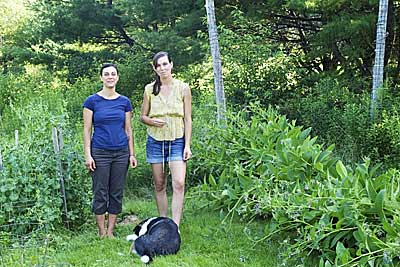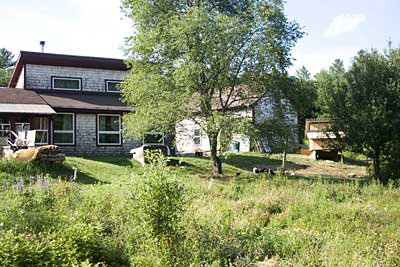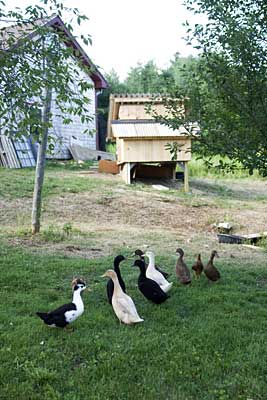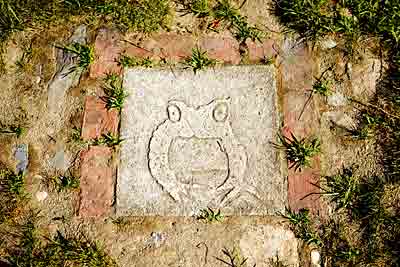 |
| Mondrian “Moe” Shumate (left) and Andrea Boothby continue Danya Klie’s care for the environment and people at Toads End Farm. Photos by Marta Madden, martamadden.com. |
By Betsy Garrold
This is a story about women, community and music.
When Danya Klie was diagnosed with terminal lung cancer in 2011, she knew that her time was short and that she did not want to “burden” her twin sister, Barbara, with her farm at Toads End in Belfast and with the task of selling it. Among Danya’s many community involvements, she had been a longtime volunteer at MOFGA, so she bequeathed her farm to MOFGA with the stipulation that it be sold to a woman or women farmers.
Klie truly embodied the “gardener” portion of the MOFGA ethos. She designed her home to enable her to live lightly on the land, and the surrounding permaculture and annual gardens reflect the spirit of the hardy homesteaders who formed a large part of MOFGA’s early membership. Klie had a 100-year plan for the land. She planted perennials in much of the garden space, installing cane fruits and fruit trees that produce food year after year. She tended her forest garden using a sustainable forestry plan, developed with a forester, so that it provides wildlife habitat and preserves wild foods for foraging, including fiddlehead greens, mushrooms and wild berries. Her extensive garden diaries document meticulously how she developed the gardens over the years and include everything from temperature highs and lows to the variety of vegetables that do best in the microclimate of this particular garden.
Chris Hamilton was a new associate director at MOFGA when Barbara walked into the office carrying Danya’s will with its carefully thought out plan. After both individuals listed in Danya’s will as having the right of first refusal declined the offer of the land, Barbara thought of family friend Andrea Boothby, who had expressed a desire to own a small piece of land and grow as much of her own food as she could. When Danya had moved from Alaska to her first home in Maine, Boothby, then 11 years old, was living next door with her mother. Danya often heard Boothby singing on her way home from school and encouraged her to continue and to overcome her shyness about singing in public.
 |
| The Homestead at Toads End. |
This echoes the stories neighbors tell of coming out of the woods surrounding Klie’s yard to hear her singing as she scythed in her garden. Boothby and Klie connected over their mutual love of music.
Boothby now travels and sings with Northern Harmony, a group that sings a Georgian lullaby of which Danya was particularly fond. And as part of Heartsong (a local group that “offers songs of comfort and peace to those who are in ill health or are approaching the end of life”), Boothby sang to Klie in the last days of her life while she was still awake and alert and could acknowledge their musical gift.
When Barbara approached Boothby about buying the land, she, in turn, thought of her friend Mondrian “Moe” Shumate and their mutual desire to create a safe space for women in good and not so good times. Shumate had come to Maine to apprentice on an organic farm and to search for a place where she could teach children about the environment, about growing things and about the great big outside world. She wanted a place where children could safely explore nature.
One of Boothby and Shumate’s favorite stories from their first year at the farm is about a young girl who came to stay while they were caring for some young ducks. They used the ducklings to wean the girl off excessive use of the computer. In fact, they say, she was so enthralled with the baby birds that she spent no time at all on the computer during her two-week stay.
While Toads End Farm was in transition, Boothby and Shumate were reading “Radical Simplicity” by Belfast resident Jim Merkel, and the concept of one person being able to support herself on 5 acres was very appealing. Toads End was 10 acres, so the math made sense for the two of them. Merkel offered to hold part of the mortgage for them, thus allowing them to avoid trying to explain to a banker what they were planning for the land. He also advised them, from long experience with various intentional living situations, some successful and some not, to draft a contract between themselves covering all the contingencies they could think of regarding how the ownership would be handled if a need to dissolve the partnership ever occurred.
 |
| The ducks and their homestead. |
 |
| The Toad of Toads End. |
Boothby and Shumate tell of having a glass of wine and brainstorming all the wildest scenarios they could imagine and how they would resolve each. When they presented the finished document to their lawyer to be translated into legalese, he was so impressed with their thoughtful work that he had nothing to add except the necessary legal jargon. Boothby and Shumate say that having hashed all this out and having it on paper has made them both feel more secure in their living situation.
Their future vision for the property includes continuing the communal uses of the living room and kitchen in the main building and adding two small cabins on the land for their prospective “nuclear” families. They also envision expanding their work with children and experiential education in the natural world. Shumate is part of a group working with home-schooled and other children in an old canning factory in Liberty that has been converted to a community space. Through that group, Boothby and Shumate have opened the farm to children several times. They are planning a more permanent involvement with area children’s groups.
Although the farm is not formally open for public use, Boothby and Shumate have offered it for various activities for women, from massage to dance lessons. Boothby says several of their female friends and acquaintances have commented on how safe and welcoming the farm feels to them, and that is exactly the atmosphere they are aiming for, hoping that by word-of-mouth this will become a gathering place for various women’s activities.
They like the fact that the curved lines of the gardens (and even of the Shaker-inspired round wood piles) and the many niches and nooks of the landscape offer women places for quiet contemplation. The sustainability of the plantings Klie started appeals to Boothby and Shumate, too, as does the fact that the garden space is shared with others in the community.
On a lowery June evening, a group of friends gathered at Toads End Farm for good food and reminiscing about Klie and her vision for this land. With two young, energetic women on the property, things are beginning to change fast. The addition of ducks and chickens led to building a shed that mimics the roofline of the house. Gatherings and bonfires occur regularly – as does singing. Several times during the evening, the group around the table spontaneously burst into song. Shape Note hymnals were produced, and a hunt began for Klie’s favorite songs. Shumate and Boothby are dedicated to continuing the purpose, flow and harmony begun by Klie’s forethought.
As we left that evening, Barbara commented that the house now “feels different but very much the same.” Danya’s spirit remains, and everyone agreed that she would be very pleased with the way her legacy is being carried into the future.
About the author: Betsy Garrold tends apple trees and honeybees on her farm in Knox, Maine, and she blogs about the politics of agriculture at thepopulistfarmer.wordpress.com.

